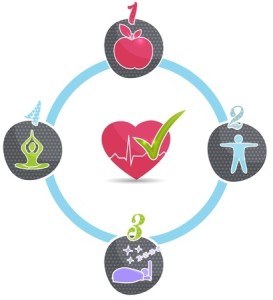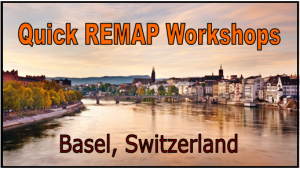PTSD and the Impact on Health
June 14, 2014
Lecture at the “Resolve Emotions to Resolve Disease Conference”
By Steve B. Reed, LPC, LMSW, LMFT | Email
 In 1990, I took some training with psychologist Stephanie Simonton1. Her husband Carl, was a physician who treated cancer patients. Together they worked with the physical and psychological aspects of cancer in their practice. Stephanie noted something striking during the training. She had an interesting observation about patients who develop cancer. She said that many of their cancer patients had experienced a significant traumatic event two or three years prior to the onset of their cancer. Although this was anecdotal, it suggested that physical maladies may occasionally have a psychological element that contributes to the disease.
In 1990, I took some training with psychologist Stephanie Simonton1. Her husband Carl, was a physician who treated cancer patients. Together they worked with the physical and psychological aspects of cancer in their practice. Stephanie noted something striking during the training. She had an interesting observation about patients who develop cancer. She said that many of their cancer patients had experienced a significant traumatic event two or three years prior to the onset of their cancer. Although this was anecdotal, it suggested that physical maladies may occasionally have a psychological element that contributes to the disease.
In 2001, a research study in Japan was able to quantify the direct impact of PTSD (posttraumatic stress disorder) on physical health2. In that study, the researchers looked at two groups of men who were identical in almost every way statistically. The one exception was that one group of men had never experienced a traumatic event. The other group had suffered a singular traumatic event ten years prior to the study that had highly impacted them. What was discovered was very important. The group of men who had experienced a traumatic event, showed suppressed immune system functioning a full decade after their trauma. The group that was not traumatized had immune systems that were normal.
In 2013, research was published in the Journal of Biological Psychiatry that showed the impact of PTSD on heart disease3. The study was conducted with U.S. military veterans. These were veterans who received treatment at V.A. facilities. Of the 663 V.A. outpatients, 230 were found to have PTSD. Both groups were compared to determine if there was a difference in the incidents of heart disease. In brief, the study found that 10% of the non-PTSD group suffered from myocardial ischemia. However, 17% of the veterans who had PTSD were diagnosed with heart disease. The editor of Biological Psychiatry, Dr. John Krystal, suggested that “increased risk for cardiac ischemia may turn out to be an important new concern for individuals suffering from long-standing untreated PTSD”.
Since 2000, I have been working on the development and refinement of the REMAP process as a treatment tool to provide relief and healing for those who have suffered from a variety of anxiety related disorders including PTSD. On Saturday, June 21, 2014, I will be presenting a lecture at the Academy of Comprehensive Integrative Medicine’s conference titled “Resolve Emotions to Resolve Disease”. My presentation is titled: Quick REMAP to Resolve Underlying Trauma. I have a number of videos that address the topic of PTSD and the use of Quick REMAP that could be useful viewing in addition to attending my lecture. The conference is on June 20th and 21st. It will be held at the Westin DFW International Airport Hotel. The website link to the conference information is: http://acimconnect.com/Events/TabId/72/ArtMID/3505/ArticleID/10/Resolve-Emotions-to-Resolve-Disease-Conference.aspx
1. Simonton, O. C., Matthews-Simonton, S., & Creighton, J. L. (1978). Getting well again. New York, NY: Bantam Books.
1990 Seminar with Stephanie Simonton
2. Kwamura, N., Yoshiharu, K., & Nozomu, A. (2001). Suppression of cellular immunity in men with a past history of post traumatic stress disorder. American Journal of Psychiatry, 158, 484-486
3. Turner, J. H., Neylan, T. C., Schiller, N. B., Li, Y., & Cohen, B. E. (2013). Objective evidence of myocardial ischemia in patients with posttraumatic stress disorders. Biological Psychiatry, 74(11), doi: 10.1016/j.bopsych.2013.07.012
REMAP — Keynote Address in Heidelberg
December 3, 2011REMAP: Innovations in Counter Conditioning the Emotional Midbrain
Keynote Address in Heidelberg, Germany
by Steve B. Reed, LPC, LMSW, LMFT | Email
I am scheduled to present a keynote address and workshop at the 2nd International European Energy Psychology Congress that will be held in Heidelberg, Germany — March 30th through April 1st, 2012.
REMAP (Reed Eye Movement Acupressure Psychotherapy) has a central focus of calming the emotional midbrain and soothing the sympathetic nervous system in order to counter condition subcortical conditioned responses. Through innovative applications of acupressure, mindfulness, breath regulation and activation of regions within the visual field, REMAP works from body to brain in order to desensitize emotional distress. Through this mechanism, the REMAP methods help to retrain the limbic system to make associations of relaxation and comfort with memories that were previously coded as painful.
A secondary focus of REMAP is to address the contribution of the thinking brain (cortex) to emotional suffering and to provide both familiar and new interventions that help.
REMAP teaches the therapist how to track the client shifting between emotional midbrain and thinking brain. By doing this, the therapist can choose a treatment intervention that targets the region of the brain that is most involved in activating or exacerbating the distress. REMAP also trains the practitioner to assess how detached or emotionally flooded the client is from moment to moment and to help them move toward an optimum balance point where treatment will be most effective.
The keynote presentation will highlight the development of the three REMAP methods: the full REMAP process, Quick REMAP and the REMAP Visual Field Treatment. It will underscore the role of innovation vs. invention in the advancement of healing and will illustrate the usefulness of the REMAP methods in the treatment of PTSD (post-traumatic stress disorder), anxiety and stress.
The workshop that is scheduled is titled “Quick REMAP: The Synergy of Evidence-Based Acupoints, Mindfulness and Psychology.”
Quick REMAP leverages evidence-based interventions and innovative approaches to bring rapid relief to emotional suffering. This workshop will provide a useful introduction to Quick REMAP and an opportunity for participants to work with one of the Quick REMAP protocols. 8G5KC4GSXNU3
Quick REMAP Workshops Scheduled for Switzerland
November 25, 2011 |
Quick REMAP Workshops – Switzerland by Steve B. Reed, LPC, LMSW, LMFT | Email |
Training dates for the Quick REMAP Level 1 & 2 Workshops have been announced for Switzerland in October of 2012.
The workshops will be held in Basel, Switzerland. Basel, the second largest city in Switzerland, is located on the Rhein river near the intersection of Switzerland, Germany and France.
The Quick REMAP Level 1 workshop will be on October 3 & 4 and the Level 2 workshop will be on October 5 & 6. The training is being sponsored by Germany psychologist Gertrud Fahnenbruck. Both workshops will be presented in English.
Quick REMAP Demonstration Video — 2008 Germany
November 19, 2011 |
Quick REMAP Demonstration Video by Steve B. Reed, LPC, LMSW, LMFT | Email |
This is a demonstration video that was filmed in 2008 at a Quick REMAP Level 1 Workshop in Germany. The video is 32 minutes in length and illustrates what a Quick REMAP treatment session might look like in clinical practice. Jutta Bockhold, a psychologist and Quick REMAP trainer in Hamburg, was kind enough to volunteer as the demonstration subject for this video. The video was filmed by Bernd Nolde and Hartmut Gerber. Bernd edited the film.
The video illustrates the use of the Quick REMAP process in the treatment of emotional features including grief, sadness and anger relating to a veterinarian mishandling putting her dog to sleep.
The Quick REMAP training took place in Ahrensburg, Germany which is just outside of Hamburg. The Ahrensburg castle was a very short walk from the hotel where the training took place and offered the opportunity for a pleasant stroll after a day of learning the REMAP process.
Omega-3s Reduce Anxiety
November 18, 2011 |
Omega-3s Reduce Anxiety by Steve B. Reed, LPC, LMSW, LMFT | Email |
In my practice, I normally recommend Omega-3s as a beneficial intervention for individuals suffering from depression. Now there is another reason that underscores the importance and usefulness of Omega-3s.
A research study1, published in the November 2011 issue of the journal Brain, Behavior and Immunity, found that taking Omega-3 fatty acids that were high in EPA (eicosapentaenoic acid) reduced anxiety by 20% and inflammation by 14% in otherwise healthy medical students.
The supplementation consisted of a 2.5 gram dose daily with a ratio of 2085 mg of EPA to 348 mg of DHA (docosahexanoic acid). This was approximately a 6:1 ratio. Reductions in anxiety levels were measured using the Beck Anxiety Inventory.
The research was conducted at the Institute for Behavioral Medicine Research at the Ohio State University College of Medicine. Studies at Harvard Medical School have already linked high EPA Omega-3s to a reduction in depression, even for those with bipolar disorder.2 Other studies have also supported the usefulness of of high Omega-3s in treating depression.3 This new research provides the first evidence that Omega-3s can produce an anti-anxiety effect for individuals without an anxiety disorder.
Combining Omega-3 supplementation with a behavioral intervention, such as Quick REMAP, may offer a doubly potent approach to helping people manage the effects of anxiety. Cognitive therapy interventions can also be blended well with Quick REMAP and Omega-3 supplementation when thinking patterns contribute to the anxiety.
1. Kiecolt-Glaser, J.K., Belury, M.A., Andridge, R., Malarkey, W.B., & Glaser, R. (2011). Omega-3 supplementation lowers inflammation and anxiety in medical students: A randomized controlled trial. Brain, Behavior, and Immunity, 25(8), 1725-38.
2. Stoll, A.L., et al. (1999). Omega 3 fatty acids in bipolar disorder. Archives of General Psychiatry 56, 407-12.
3. Peet, M., & Horrobin, D.F. (2002). A dose-ranging study of the effects of ethyleicosapentaenoate in patients with ongoing depression despite apparently adequate treatment with standard drugs. Archives of General Psychiatry, 59(10), 913-919.
Treating Domestic Violence PTSD with Quick REMAP
November 13, 2011Treating Domestic Violence PTSD with Quick REMAP is a PowerPoint case study that is illustrating how the Quick REMAP treatment method can be used to resolve the distress associated with a traumatic assault. Treatment results are measured with the Impact of Event Scale, the State-Trait Anxiety Inventory and Heart Rate Variability Analysis (HRV). The slides contain links to more detailed information available on www.remap.net and www.remapinstitute.org.
This post traumatic stress disorder client was successfully treated during one 55 minute treatment session. Although this is a little faster than the two-session average that is noted in the REMAP Pilot Study and the individual case studies with PTSD/war traumas survivors, it does demonstrate how rapid relief can sometimes come for clients who respond very well to Quick REMAP.
Treating domestic violence ptsd with quick remap
View more presentationsfrom Steve Reed
Quick REMAP Training Dates for the US and Europe
November 6, 2011Quick REMAP Workshop dates have been set for the US and Europe for 2012.
US training locations include cities in Texas and Oklahoma. Presentations are scheduled in Europe for Germany and Belgium with a possible addition of dates in Switzerland. I will be leading all of these trainings.
For details about dates and locations, please see the REMAP Institute training calendar.
Quick REMAP Level 1 Workshop details.
REMAP Institute: Easing Emotional Suffering | Training Mental Health Professionals
October 31, 2011Welcome to the REMAP Institute. This is a training institute that has the following purpose and goals.
Purpose: The central goal of the REMAP Institute is to contribute to the easing of needless emotional suffering in the world.
The REMAP Institute seeks to facilitate easing emotional suffering primarily through:
- Providing training to a growing number of mental health professionals who will then be able to reach those who are in need of emotional relief
- Providing a certification program that will encourage a sufficient level of training so that the practitioner is able to integrate and utilize the REMAP treatment tools
- To provide a central listing of certified practitioners and candidates for certification
- Develop a group of approved trainers around the world who are actively engaged in training new REMAP practitioners
- Raising awareness of how the REMAP treatment tools (Quick REMAP, the full REMAP process and the REMAP Visual Field Treatment) can help ease emotional suffering through encouraging research, case studies, articles, videos, and professional presentations and
- Offering professional training in complimentary tools that will help the REMAP practitioner be more effective
Secondarily, the REMAP Institute may also seek to ease emotional suffering by:
- Offering occasional self-help workshops to the public
- Encouraging humanitarian outreach
- Providing support and encouragement for REMAP trainers and practitioners to offer self-help workshops and by
- Developing online resources and distance learning packages that can reach those who do not have access to workshops and trained practitioners





